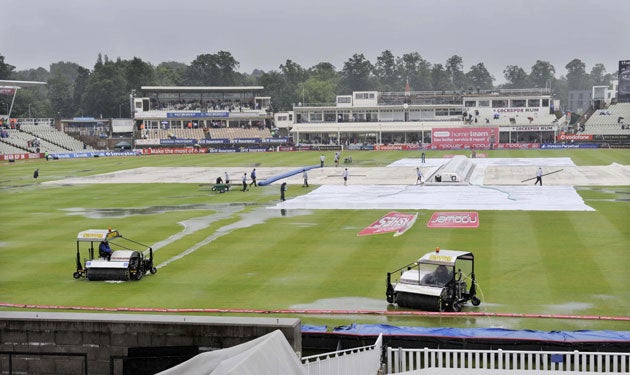England see chance to turn the screw
Delays no help for rattled Australia, writes Stephen Brenkley at Edgbaston

England can win the Ashes this summer. They probably should, they may still not. Little play though there has been in the first three days of the middle Test match, there has been a noticeable shift in the position of the teams.
For the second match in succession, Australia have shed first-innings wickets as though they were distributing alms to the poor. At Lord's seven went for 93, at Edgbaston it was seven for 77, and though the tail in both cases offered resistance it has been damage limitation, not rebuilding.
In both instances, England will have been delighted at the form of Jimmy Anderson. He wrecked Australia's top order in the Second Test, where his deeds were to be submerged by the form and emotional tide generated by Andrew Flintoff later, and swept aside their middle and late order in the Third.
England were denied the opportunity to make much of their advantage yesterday. Play was finally called off for the day at 2.45pm. Andy Flower, the coach, said: "As far as the game's concerned it's a pity and looking at the outfield I don't know how much play we're going to get tomorrow either. Steve Rouse, the groundsman, has said we might get 70 overs in and that would be a godsend if we did."
It was the first time that a day's play had been washed out in an Ashes match in England since the first day of the Lord's Test in 1997. Although Glenn McGrath then took eight English wickets, there was no time left in the match for any result but a draw.
England may take more succour from the abandonment of the first day in Melbourne in 1998-99 when they went on to win the match by bowling out Australia in their second innings in 46.4 overs. England will now be musing along the lines of two full days' play, batting on one to build a lead of, say, 200, and bowling on the other when they bowl out Australia.
As Flower said: "You can see how quickly things can happen in a game so a result is definitely possible. We're not really thinking in terms of preserving our lead. We've got two hopefully fullish days of cricket here and we're not really looking any further forward than that."
The outfield had become a lake by mid-afternoon yesterday and if the pitch has remained dry thanks to wonderful covering, it is difficult to imagine that a run feast is to be set before the eyes in the next two days. The draw remains favourite.
When the ball is swinging there may be no more potent force in the world than Anderson at present. Equally, when it is not swinging or he does not get it quite right, he can look hittable. But there will be many good days for the Burnley Express round the corner. He has taken 22 wickets in Test matches this English season and this one is not over yet.
On Friday morning, the first incisions were made by Graham Onions, a bowler in resplendent form and thus a splendid selectorial pick. He was rewarded yesterday with an incremental contract and there is no greater prize to an English professional cricketer, save for a central contract.
The manner in which fortunes have changed since Australia dominated proceedings at Cardiff has been remarkable. But it may also reflect the closeness of the teams. Australia are ordinary compared to the great sides they have fielded in the past 15 years, and like England they are in development. If they were a drug they would still be at the guinea pig trial stage and would not yet have been granted prescription approval.
But it is England, nonetheless, who have made most of the running in their own country. It was an authentic win at Lord's, built on a solid total, which led to the destructive bowling and disorganised batting that followed. Australia seemed to have regrouped but the manner of Friday's collapse may eat at their soul.
At 126 for 1 overnight they were controlling the direction of the match. To be bowled out for 263 was not in their dreams as they slept on Thursday evening. England's bowling was impeccable (their fielding less so).
Perhaps Australia will get out of this match but they know they have to do it all again at Headingley now. To keep the Ashes, they have to win at least one game, they cannot afford to lose another. Perhaps it will be England's turn next to have a couple of bad days and let Australia in: that is what happens to ordinary teams. But so far, England have moved ahead despite their brittleness. They have been better in overcoming the loss of form of key players and since Cardiff, one, usually two of their bowlers have made serious inroads into the opposition.
One element of this match that has been the subject of attention bordering on adulation has been the decision by Andrew Strauss, England's captain, to allow Australia to change their team after the toss. The tourists' admirable wicketkeeper-batsman Brad Haddin (though his batting, it is true, may be more admirable than his wicketkeeping) broke a finger in the warm-up. Strauss has been praised for his chivalry, though the alternative (and his right) was to refuse the Australians the opportunity to play the debutant, their reserve keeper Graham Manou.
It would have been much more noteworthy had Strauss told the Australians where they could go. It was never likely to happen.
Join our commenting forum
Join thought-provoking conversations, follow other Independent readers and see their replies
Comments
Bookmark popover
Removed from bookmarks